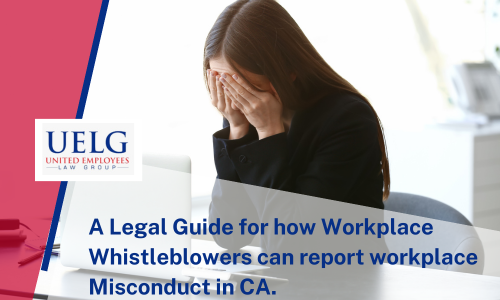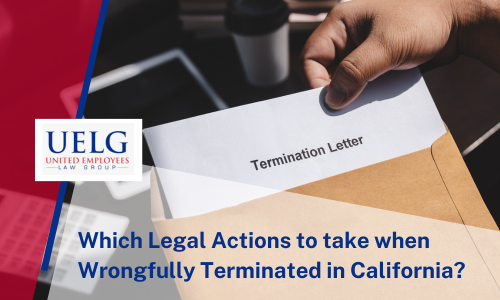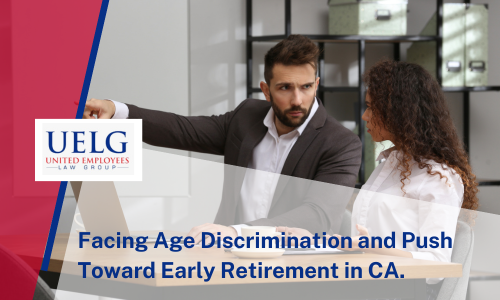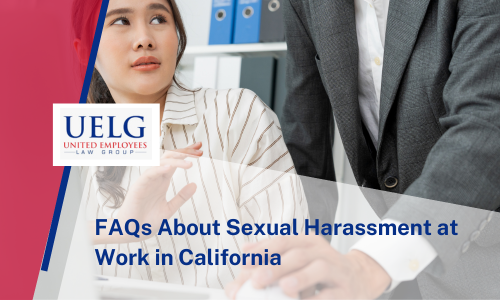Welcome to a dedicated space where your legal concerns regarding sexual harassment in the California workplace can be addressed, and options for a solution found. The seasoned attorneys at UELG focus on navigating the intricacies involved in cases of harassment at work. This introduction sets the stage for an insightful journey into understanding your rights, exploring legal strategies, and finding tailored solutions. As we delve into this critical topic via this FAQ session, trust that the skill and acumen of UELG’s sexual harassment lawyer Los Angeles team, and UELG’s anti-discrimination legal team serving all of California, are here to guide you toward a workplace environment free from harassment.
- Which California harassment laws are designed to regulate behavior at work?
California has strong employment laws and regulations that prohibit harassment at work, including the Fair Employment and Housing Act (the FEHA), found in the California Government Code beginning at section 12900. The FEHA outlines the rights and obligations of employers towards its workers, with an eye toward fostering a positive work environment. - What does California law consider to be harassment at work?
California law considers workplace harassment to include unwelcome conduct in the workplace based on protected characteristics (including sex or sexual orientation, race, age, and disability), that is severe or pervasive enough to create a hostile or abusive work environment, or that results in an adverse employment decision (such as termination, demotion, or denial of a promotion, for example). - How does California’s Fair Employment and Housing Act (FEHA) tackle workplace harassment?
California’s Fair Employment and Housing Act (the FEHA) is an integral part of state legislation that is designed to safeguard workers from harassment at work. Its provisions encourage justice and equal treatment in employment matters and in the workplace, by defining conduct that is unacceptable in the workplace and providing a way for affected workers to complain about and obtain redress for harassment at work. - What constitutes a hostile work environment in California?
Under California law, a hostile work environment is created when pervasive and severe harassment, or offensive or discriminatory conduct, restricts or interferes with an individual’s work, making the workplace intimidating, offensive, or abusive. No one should ever have to endure such harassment at work. - How does one report harassment at work, and what steps are involved in the reporting process?
If you experience harassment at work and want to do something about it, a good way to start is to promptly and completely document instances of harassment. This can include writing down the date and time of each occurrence, the persons involved, and witnesses to the harassment. You can report the occurrence to your supervisor or HR as instructed in the employer’s employee manual, and can also report the harassment to the federal and state agencies that enforce workplace anti-harassment laws – California’s Civil Rights Department (CRD) and the federal Equal Employment and Opportunity Commission (EEOC). It is also advisable for you to cooperate with any subsequent investigations by your employer, the CRD or EEOC. You may want to speak with a lawyer for advice on how to best approach and accomplish these steps. - What legal recourse does California law provide for victims of workplace harassment?
In California, those who have been harassed at work may file a complaint with California’s Civil Rights Division (CRD) or the federal Equal Employment and Opportunity Commission (EEOC), and if appropriate, file a complaint with a California court of law. The purpose of filing a complaint is to seek redress for the harassment at work, which can include injunctive relief, monetary damages, and other suitable remedies to hold the employer and others involved accountable, and to seek compensation and redress for the injuries suffered. - What are the roles of the California Civil Rights Department (CRD) and the federal Equal Employment and Opportunity Commission (EEOC) in addressing workplace harassment issues?
California’s Civil Rights Department (CRD) and the federal Equal Employment Opportunity Commission (EEOC) are the agencies that enforce, respectively, anti-discrimination laws such as California’s Fair Housing and Employment Act (FEHA) and the federal Title VII of the Civil Rights Act of 1964 (Title VII), as well as other California and federal anti-harassment and anti-discrimination laws. They provide and oversee the procedures by which employees and other workers who are experiencing harassment at the workplace can pursue legal redress by filing a complaint. These agencies can decide to pursue your legal claim, or they can issue a Right to Sue letter, which allows the harassed worker to pursue their workplace harassment claims in a court of law. Strict deadlines exist to bring these claims, and if not timely brought they may forever be lost, so it is important to act as soon as possible to gather evidence and file a claim. - When should you contact a sexual harassment attorney regarding your experience with workplace harassment?
If you have experienced workplace harassment anywhere in California, including Los Angeles, it is advisable to consult as soon as possible with a sex discrimination lawyer who has the knowledge, skill and experience to address harassment at work issues. This is because there are strict time deadlines for the filing of workplace harassment complaints, and also because issues involving harassment at work can be complex. To help ensure success with your claim, and for peace of mind, it is advisable to obtain proper legal representation and guidance for your workplace harassment issues.
Talk to our UELG sex discrimination lawyer team to better understand your rights and the solutions available to you under California sexual harassment laws.
To gain a comprehensive understanding of sexual harassment laws and solutions in California, we recommend scheduling a meeting with our seasoned UELG sex discrimination lawyer and anti-harassment team. We have the knowledge, skill and experience to navigate the intricacies of sexual harassment lawsuits. During the consultation, our sex discrimination lawyers, who understand the sensitive nature of the issues, will listen carefully and in confidence, provide valuable insights, discuss potential legal strategies, and outline solutions tailored to your specific situation. This personalized approach helps to ensure that you receive answers to your questions, solutions to your workplace dilemmas, and peace of mind. Contact us at your earliest convenience to schedule a meeting, and allow us to address your concerns and work toward a resolution aligned with California’s employment anti-harassment legal framework.
Conclusion
Empower yourself with the knowledge and support needed to address your California workplace sexual harassment issues, as well as any other harassment at work issues. Schedule a consultation with UELG’s seasoned sex discrimination lawyer team. We have the acumen to navigate the complexities of these cases. Gain insights, explore legal strategies, and discover solutions tailored to resolve your situation. By taking this step, you are proactively safeguarding your rights and fostering a workplace environment free from harassment. Contact UELG at (888) 455-7434 now to schedule a meeting and move forward with confidence to effectively address and resolve sexual harassment matters. Your well-being and legal rights are our priority.












